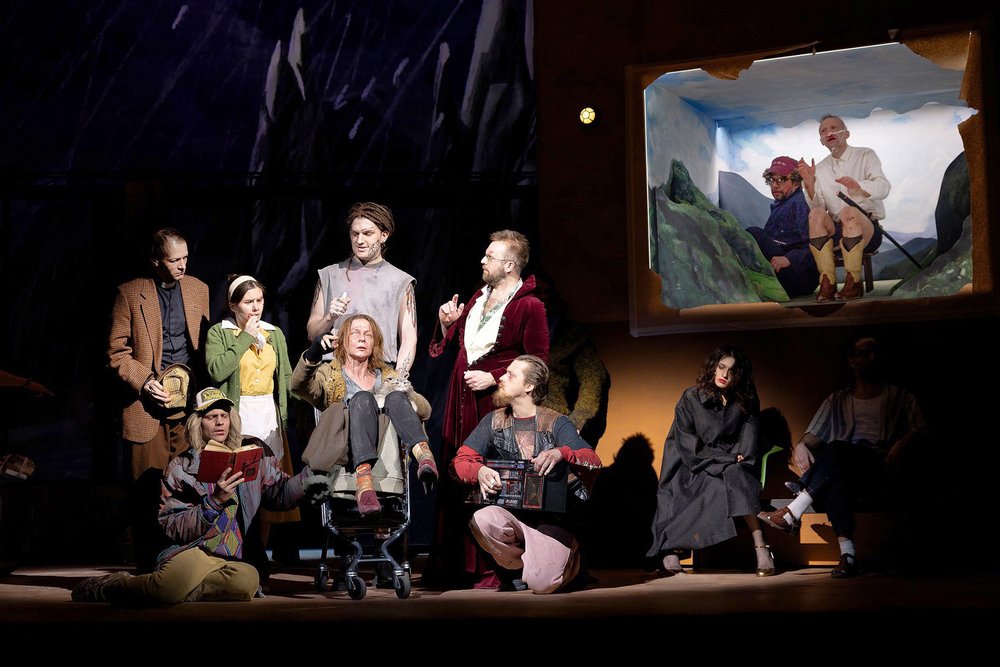Don Quixote Reimagined: Fedorov’s Theatrical Provocation

Don Quixote. Based on the novel by Miguel de Cervantes. Directed by Anton Fedorov. Courtesy of Theatre of Nations
Anton Fedorov’s controversial adaptation of Cervantes’ classic at the Theatre of Nations in Moscow set in a rundown laundromat transforms Don Quixote into a schizophrenic tyrant. This violent and surreal production has divided audiences while exploring the dark consequences of misguided idealism through provocative visuals and fragmented language.
Popular millennial Russian theatre director Anton Fedorov (b. 1981) is best known for his unconventional interpretations of the classics and performances with a punk vibe. His recent debut at the Theatre of Nations in Moscow is a startlingly provocative interpretation of Miguel Cervantes’ novel Don Quixote, which has sparked off a fierce debate among local critics and audiences. Far from a straightforward adaptation his production offers a complex and unsettling exploration of the main themes in the novel through a distinctly modern lens.
The play opens with a quote from Vladimir Nabokov’s essay on the novel projected on the curtain which sets the tone for what is to follow: “follow me, unsympathetic reader, who enjoys watching a live dog being inflated with air and kicked like a football”. This unsettling epigraph serves as a key to understanding Fedorov's vision, and at a stroke signals a departure from conventional light-hearted and sentimental readings of the novel. Nabokov, in bold contrast to traditional interpretations that emphasize its gentle satire and the endearing idealism of the protagonist, saw Don Quixote as a “catalogue of cruelty.” This emphasis on the novel’s inherent violence and the often harsh treatment of its characters forms a crucial subtext to Fedorov’s production.
The stage is transformed into a run-down self-service laundry with glimpses of what looks like a Southern European street through the large windows and evoke urban paintings by Edward Hopper (1882–1967) like his iconic ‘The Nighthawks’ (incidentally a favourite painting of film director David Lynch, whose portrait hangs on the laundry wall looking over the phantasmagorical and surreal maniacal action, where reality blends with dreams - or nightmares.
In Fedorov’s version, Don Quixote played brilliantly by Timofey Tribuntsev (b. 1973) is not a desperate romantic but a schizophrenic tyrant, holding his niece, a barber, a priest and a random Canadian guy as hostages. His maniac desire to make the world a better place only turns it into a trashy bloodridden action B-movie. The films of Quentin Tarantino are a palpable inspiration, especially seen in the two Mexican gangsters who speak a kind of broken Spanish and are literally washing money in the laundry, easily characters of ‘Pulp Fiction’. A skinny Don Quixote who rides a moped instead of a horse, and his fat squire Sancho Panza on a bicycle instead of a donkey, hilariously played by Semyon Steinberg, (b. 1984), together make up a tandem of comical yet dangerous criminals.
As both director and set designer, Fedorov engages viewers in a sort of association game with art history. As well as the hopperesque setting, there is the Spanish Golden Age paintings by Diego Velázquez or Jusepe de Ribera recreated with skillful use of composition, colour and light. Although the characters are mostly dressed in rags, sometimes Fedorov has them group together imbuing them with a sense of grandeur. Pablo Picasso’s ‘Guernica’ appears in the fight scene when sham human arms and legs are scattered around the stage, acquiring a coldblooded relevance in the context of the story, where well-intentioned idealism can lead to brutality.
Art, cinematography and visual effects play an important role in Fedorov’s productions. In ‘Don Quixote’ regular collaborator and artist Nadya Goldman (b. 1992) has created background animation which depicts imaginary magical landscapes with mountains, caves, and windmills, a cheesy comic-book cartoon illustrating a love story, or police cars in streets somewhere in Venezuela or Cuba. The blue starry sky hovering above the dirty, foul-smelling space symbolizes, in the words of theatre critic Natalia Vitvitskaya, “the beautiful, the eternal, the real,” which exists only in fiction or on paper. Reality is presented as merciless, and attempts to make everyone happy only result in tyranny.
The response to the play has been divided both among critics and the general theatre going public. Alongside glowing reviews calling the production a masterpiece and one of the most talked-about premieres of the season, there are also very negative comments, describing the play as a boring act of endurance. Members of the audience often leave during the interval – perhaps they expected to see noble Spanish hidalgos but found themselves looking at a mob of scumbags shouting and swearing. Fedorov’s approach and use of speech and language is remarkable – as modernity no longer functions through well-structured texts, his performances are made of quotes, memes, rambling lines, sometimes just interjections. It is not to everyone’s taste.
Some critics have described ‘Don Quixote’ as an “endless Mexican soap opera,” focusing on violence as the most marketable product of contemporary theatre. But violence is a timeless bestseller, relevant in both Cervantes' time and today. The production certainly raises questions about the boundaries of normalcy and the viability of unrestrained striving for good in the contemporary world, and the answer that Fedorov gives us is not comforting.
The play indeed lasts a staggering three and a half hours, and is full of violent episodes, vulgar jokes and awkwardness, and despite the many departures from convention, it meticulously follows the novel. There is one character who is quiet all the time, a random person who comes to the laundry to wash his clothes and reads ‘Don Quixote’ while he waits. At some point he falls asleep, and there is the lingering sense that maybe everything you see on the stage is in his dreams, maybe there was no violence and humiliation in this strange place, maybe there were no gunshots, nor gangsters nor hostages. That is what David Lynch did and maybe that is why his portrait oversees all the action looking down from above on the wall.















